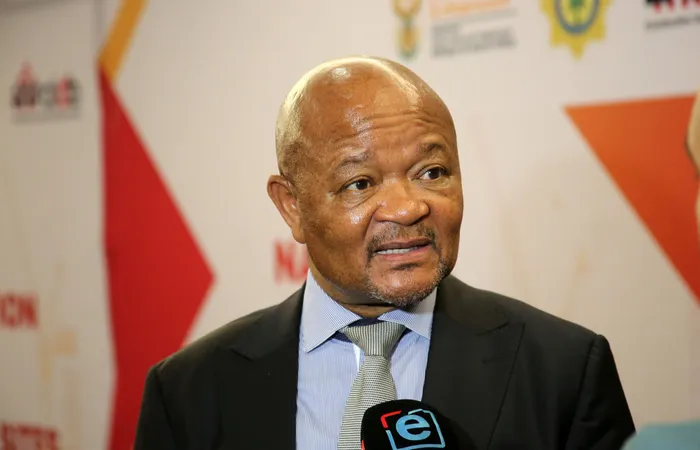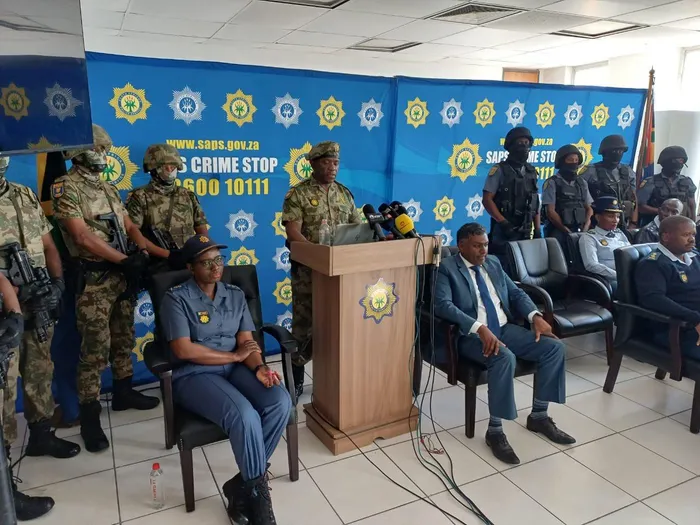Mchunu implicated in criminal syndicate

Police Minister Senzo Mchunu.
Image: Tumi Pakkies/Independent Newspapers
THE disbandment of the political killings task team without informing the national police commissioner, Fannie Masemola, was influenced by the sterling work that they performed in Gauteng to uncover the criminal syndicate that involves some members of the criminal justice system operating in Gauteng province.
This is according to KwaZulu-Natal Police Commissioner Nhlanhla Mkhwanazi when making damning allegations against his colleagues and politicians, including Police Minister Senzo Mchunu, whom he alleged were part of serious crime cartels in Gauteng.
In a statement, Mchunu rejected Mkhwanazi’s "wild allegations and claims on a variety of issues".
“The Minister of Police will never allow his integrity, that of the Ministry or the SAPS at large, to be undermined by insinuations made without evidence or due processes, from anyone, including Lieutenant General Mkhwanazi. We will be reviewing the Provincial Commissioner’s statements and consider appropriate action. All these statements made by him in public require an urgent, thorough, and transparent investigation, on a proper platform,” Mchunu said.

KZN Police Commissioner Lieutenant General Nhlanhla Mkhwanazi at a media briefing on Sunday at the SAPS KZN Headquarters.
Image: SAPS
Mkhwanazi questioned Mchunu’s decision to disband the political killings task team without informing Masemola, and himself as the provincial police commissioner.
The task team, established in 2018, was a multidisciplinary unit focusing on politically motivated killings and related crimes in KwaZulu-Natal.
“The team has been investigating a total of 612 dockets. These cases include murder, attempted murder, intimidation, conspiracy to commit murder, and other cases.
“On the 26th March 2025, a total of 121 case dockets under investigation were taken away from the task team as directed by the Deputy National Commissioner for Crime Detection, Lt General Shadrack Sibiya, acting on the instruction of the Minister of Police to disband the task team. This was done without the authority of the National or the Provincial Commissioner,” Mkhwanazi said.
These case dockets have been sitting at the head office ever since without any investigation work done on them, he said.
Mkhwanazi said the link between high-ranking police officials and politicians, some of whom are serving in Parliament, was established after the Gauteng Organised Crime Investigation Unit requested assistance from KZN in 2024 with an investigation to dismantle an organised crime syndicate operating in the country and controlled in Gauteng province.
Mkhwanazi then deployed ten members from the task team to support the Gauteng Organised Crime Investigation Unit.
He claimed this investigation has unmasked the syndicate which involves politicians, law enforcement (SAPS, Metro Police & Correctional Services), prosecutors, judiciary, and is controlled by a drug cartel as well as business people.
“Despite all these challenges, we acknowledge and appreciate the resilience of the members of the task team."
He stated that the task team remains operational, albeit with attempts to disrupt its work.
Sibiya also denied allegations made by Mkhwanazi.
“He (Mkhwanazi) must stop behaving like a criminal and behave like a disciplined member of the police. Tell him to stop threatening people and talking about violence there. He must stop behaving like a warlord. He’s a member of the police,” Sibiya told the SABC.
He added that he was caught off guard by Mkhwanazi’s accusations against him, adding that the KZN Commissioner was angry over the arrest of crime intelligence chief Lt-Gen Dumisani Khumalo.
Khumalo, who was appointed Crime Intelligence boss in December 2022, was arrested last week.
He made his first court appearance, with six colleagues, on corruption charges on Friday and plans to plead not guilty.
Professor Nirmala Gopal, a criminologist from the University of KwaZulu-Natal, said she was not completely surprised by these allegations.
“I believe many South Africans might have had suspicions, but no concrete proof. What these allegations do is give credence to what many have suspected, specifically concerning high-profile pockets of corruption in SAPS.
"Of course, the most critical concern for our democracy is the lack of accountability, poor monitoring, and the lack of seriousness in identifying and rooting out this form of behavior. It further erodes public trust in the SAPS,” Gopal said.
She added that the police might initiate disciplinary action against Mkhwanazi for bringing the SAPS into disrepute and dismiss him from the service.
Professor Ntsikelelo Breakfast from the Nelson Mandela University said: “The President will have to come in and make a decision, and knowing his character, he will take sides. Politicians tend to lean towards decisions that can keep them in the political office longer,” Breakfast said.
Portfolio Committee on Police, Ian Cameron, said: “The allegations, if correct, have far-reaching implications on the effectiveness of the South African Police Service and require immediate attention. The committee has long highlighted concerns over the rot within the South African Police Service (SAPS) which impacts its ability to investigate acts of crime and bring the worrying crime statistics down.”
He said the president needs to lead by outlining a process to investigate the allegations and restore the credibility of the SAPS.
“What is clear is that Lieutenant General Mkhwanazi has taken great personal risk to make these allegations, and the committee, Parliament, and the people in general must demand answers,” said Cameron.
Cape Times
Related Topics: